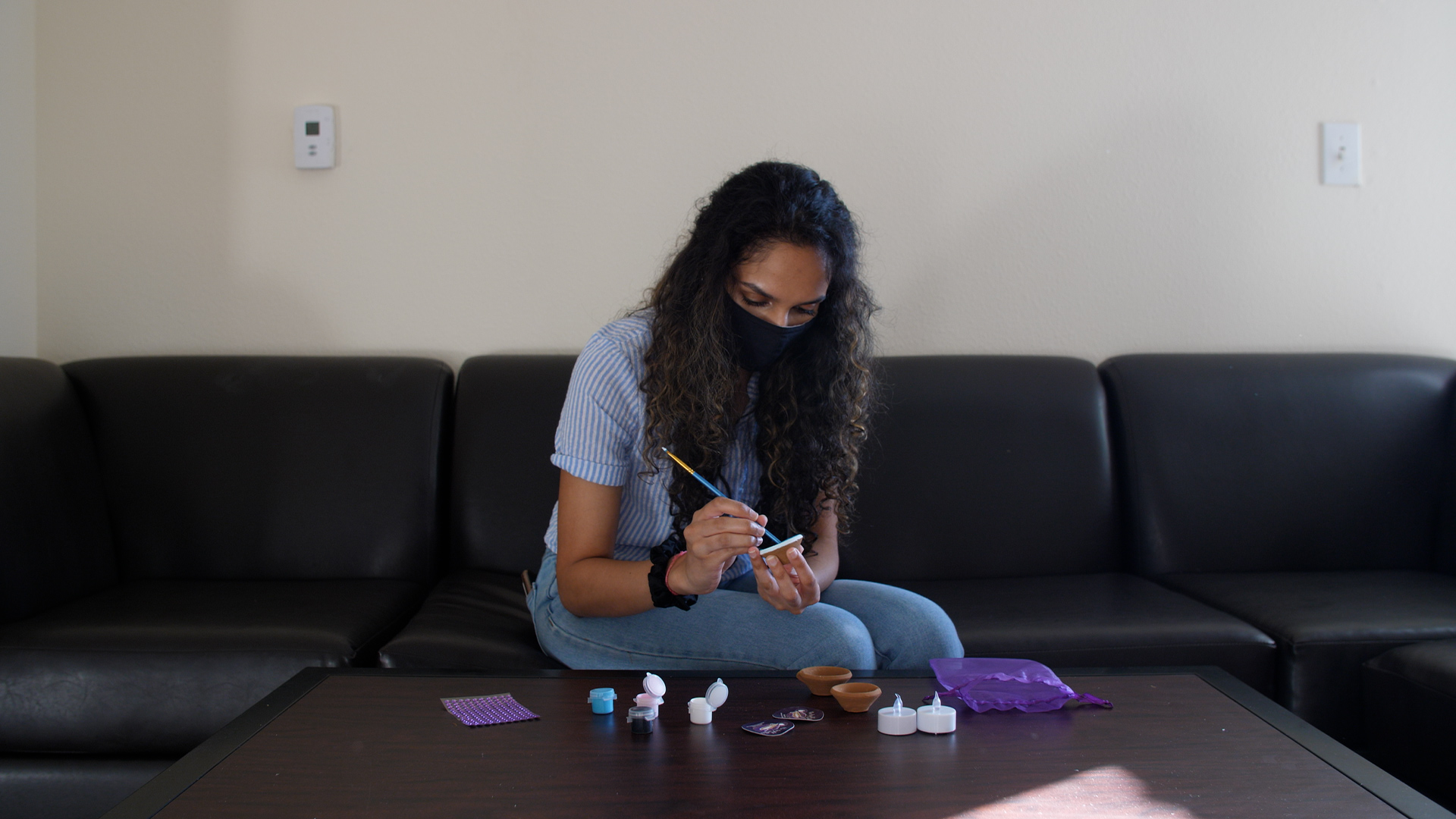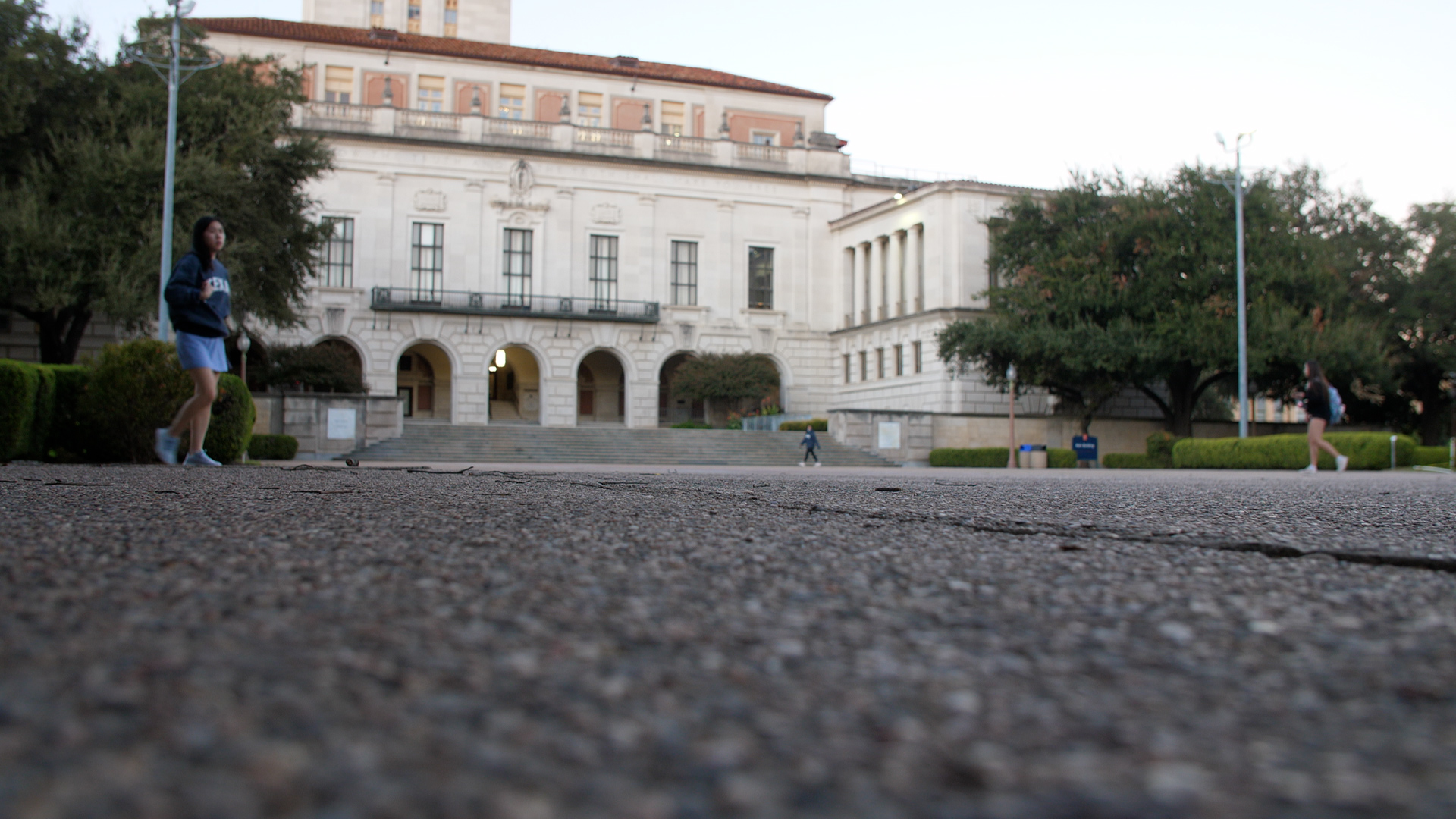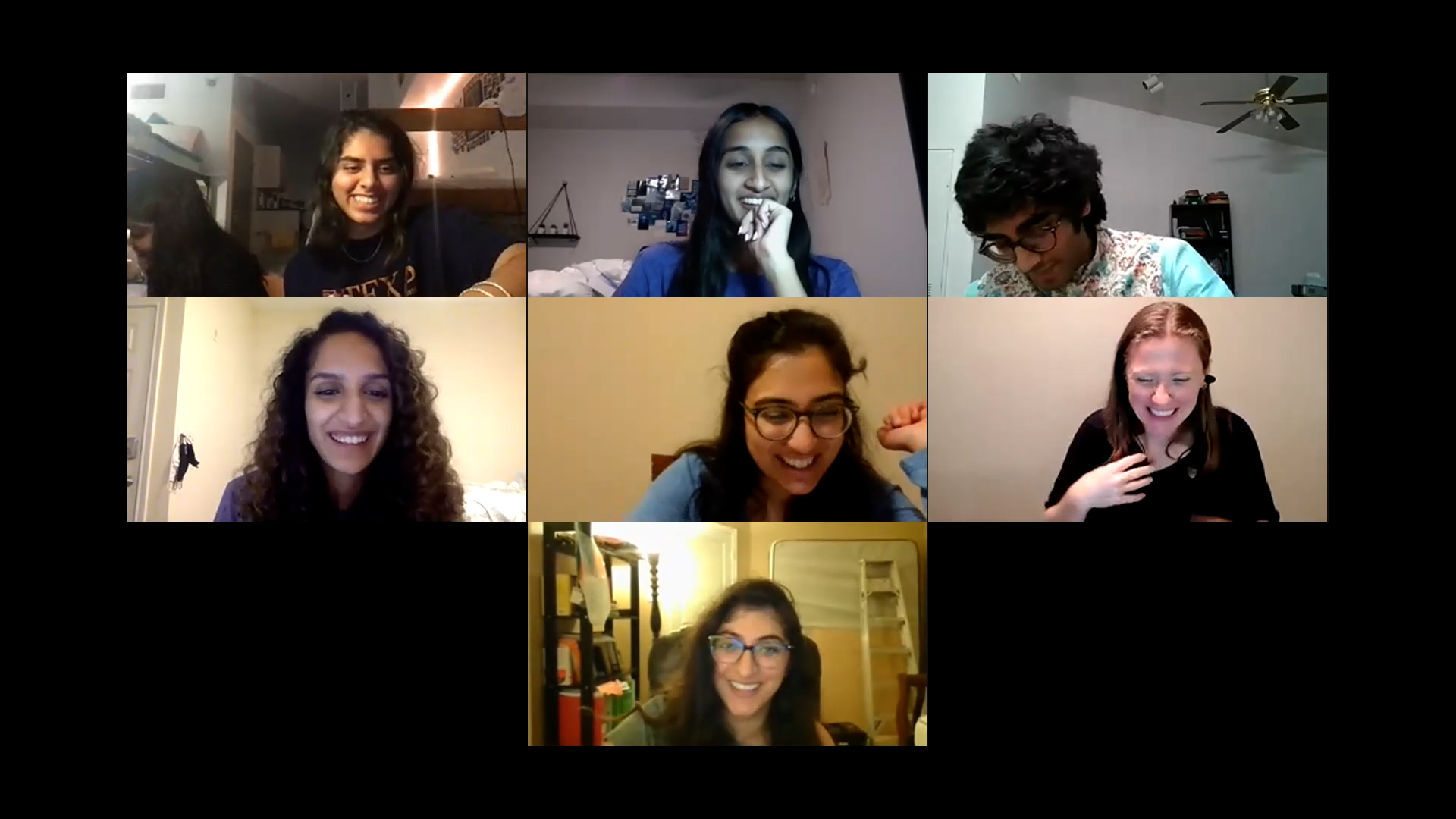A Light In The Dark
Gauree Srinivasan gestures to a photo on her laptop. In the foreground is her fellow Hindu Students Association member Lakshita Motwani. Behind her on the Main Mall at The University of Texas at Austin, a massive crowd mills around a series of booths illuminated by string lights and candles.
“Diwali is a super cool event on campus,” she says. “We estimate about 3,000 attendees every time.”
Gauree Srinivasan decorates a diya, a traditional clay lamp, for Diwali. The Hindu Students Association sent out DIY Diya kits to their online Diwali attendees, mixing arts and crafts with the online experience.
As a core member of the UT Austin HSA, Srinivasan has been part of the organizing force behind this Festival of Lights, one of the largest events on campus. As Srinivasan puts it, Diwali is the festival that “brings family together the most,” so the HSA works to capture that essence for students not spending the holiday with family, some for the first time. Lights are strung, fireworks are lit, dancers and musicians perform and friends come together.
“It's a kind of like why I've decided to stick with this org, not just because of the family that it provides me, but also like the sense of home that I'm able to provide other people,” she says.
But this year there were no booths, no food, no dancers. Like many organizations on campuses across the country, Covid restrictions prevented the HSA from holding a large in-person event.
It’s a dramatic shift from the campus life that drew Srinivasan to the college as a high school senior.
“There was always like something going on,” Srinivasan says. “I really liked how energetic it felt.”
But now with roughly half the student body learning from afar this semester, that energy has dissipated.
“It just felt like a ghost town or something,” Srinivasan says. “This doesn't feel like the school that I know.”
A few students walk past the Main Mall below the UT Tower. Usually teeming with students and events, the area is mostly empty due to Covid restrictions on gatherings and many students opting to not return to campus this semester.
Doug Garrard is the deputy dean of students at UT Austin. His office helps the more than 1,200 student organizations with everything from tracking service hours to training and event planning. He says this fall hasn’t looked like your typical semester.
“Typically on any given day, there's just a wealth of social, cultural, educational events occurring that are hosted by our organizations,” he says “That has gone away … in the sense of what we’re typically accustomed to.”
Garrard says in a normal year their office will receive on average 3,500 indoor reservation requests and 1,580 outdoor reservation requests. This can be for anything from weekly club meetings to big events like Diwali. This fall, they’ve received just 12 indoor requests and 11 for outdoor activities. Student organizations can still host in-person events on campus, but they need to adhere to a list of safety precautions. Many groups have instead opted to move their events online.
“I think our student organizations are getting very creative,” Garrard says. “But there's that fatigue.”
“Zoom fatigue” is the mental and physical toll that conducting social interactions via video conferencing can take on someone. Various issues cause this like audio delays or trying to focus on everyone in a large group. But a big issue is what we’re not seeing.
“We get so many cues from other people from their body language,” Ashwini Ashokkumar says. Ashokkumar is part of the Pandemic Project at UT Austin, where they study the psychological effects of the pandemic. She says studies show video conferencing doesn’t give the same reward response that person-to-person interactions give.
“We don't get to see people's body language,” Ashokkumar says. “Because we don't get those other cues, I think we have based so much more attention to everything that's being said, which is kind of exhausting cognitively.”
Gauree Srinivasan laughs along with other attendees at the Hindu Students Association online Diwali celebration. Like many organizations, the HSA had to get creative to find ways to celebrate holidays this year.
But Ashokkumar says it is possible to have engaging events online, and that we can take comfort in knowing that virtual events are the safest parties to host right now.
“I do think it is possible to have positive, fun, online interactions,” Ashokkumar says. “In terms of the pros, I can't think of any pro better than just that meeting in person is risky.”
Risk factored into the HSA decision to make Diwali a virtual event this year.
“We've never done virtual events before,” Srinivasan says. “It was kind of challenging because how do you encourage attendance? With classes and meetings and everything being conducted on your laptop, no one really wants to go to another event. And also how do we still maintain the essence of these festivals while trying to come up with a totally new way to celebrate and like a way that is feasible when in like the middle of a pandemic?”
Their solution? A combination of the tangible and virtual. They started the Zoom event with pujas led by fellow students. The evening was capped off with DIY Diya kits for attendees to decorate at home and a livestreamed fireworks display. The creative solutions made the event stand out from past Diwalis for Srinivasan.
“It definitely felt more special,” she says, “Because it was such unique circumstances, these are events that are kind of gonna be remembered by people.”
Traditionally, the HSA picks a theme for the Diwali celebration. This year, it was The Light Within, a reflection on inner strength and resilience. It’s a theme that speaks to Srinivasan’s experience this year.
“A pandemic can't stop me,” she says. “It can't break down the relationships I have with people, the ties I feel to my community. Even if everything else can be affected, those things can’t, and then I can find strength in that.”
Community journalism doesn’t happen without community support.
Got story ideas, advice on how we can improve our reporting or just want to know more about what we do? Reach out to us at news@klru.org.
And if you value this type of reporting, then please consider making a donation to Austin PBS. Your gift makes the quality journalism done by the Decibel team possible. Thank you for your contribution.
More in Culture:
See all Culture posts








Contact Us
Email us at news@klru.org